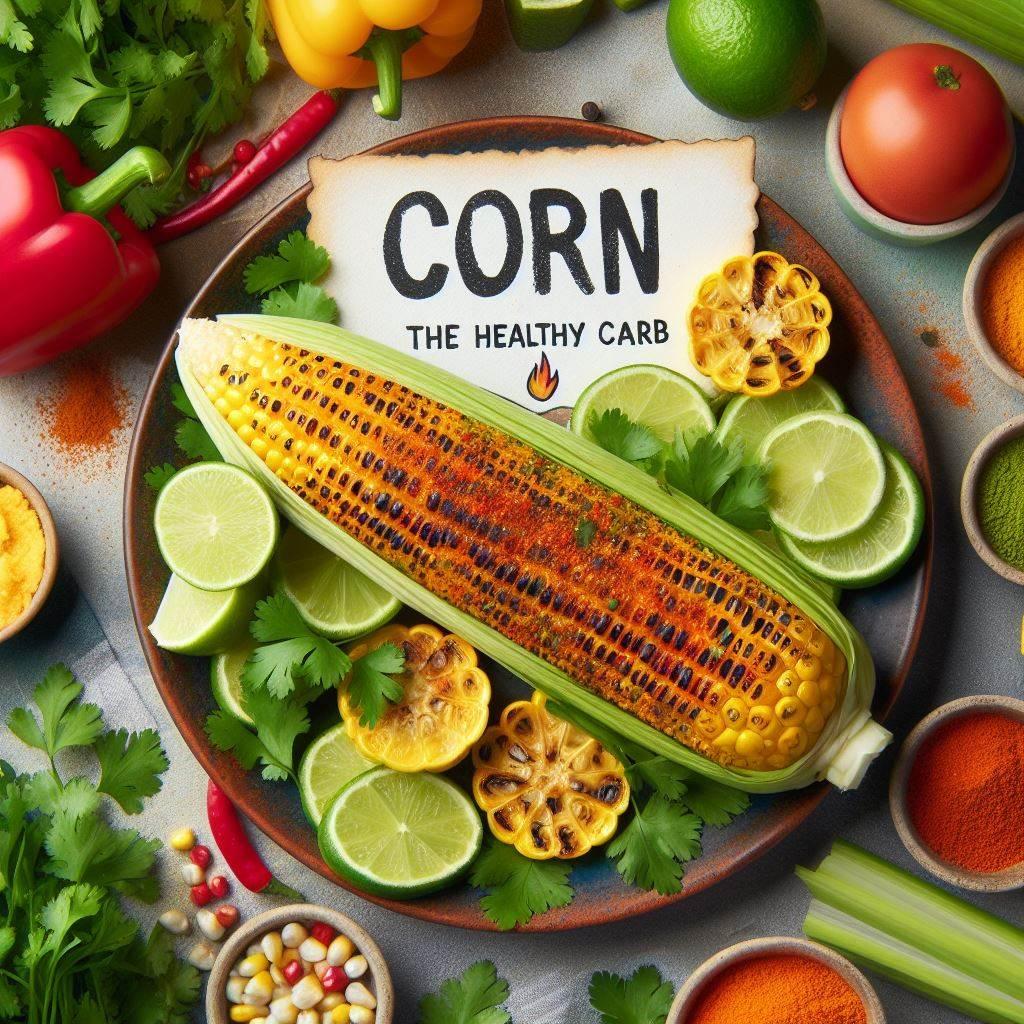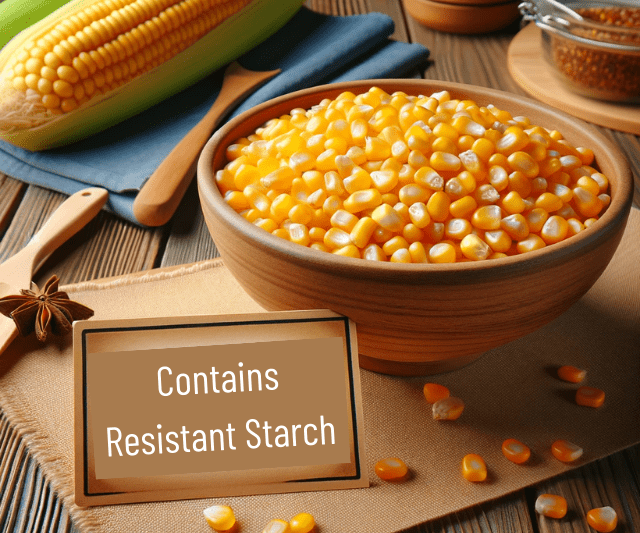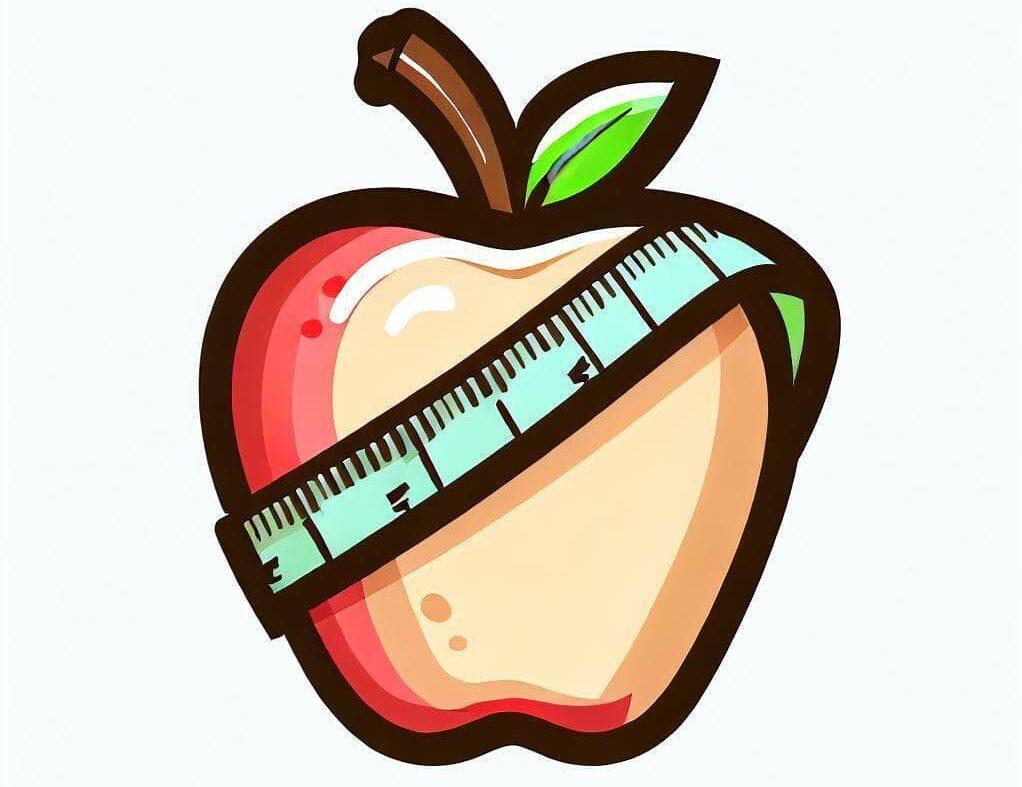Is Corn Good for Weight Loss?
This post may contain affiliate links which means I may receive a commission for purchases made through links at no extra cost to you. See my disclosure policy for more information.

Yes, corn is good for weight loss if you don’t eat too much of it. A cup of corn has 125 calories and 27 grams of carbs.
This means it gives you energy without too many calories. So, for these reasons, it’s fine to have corn in your diet when you’re trying to lose weight because it gives you good carbs.
However, like with any other sources of carbs, the timing and amount of corn you eat matters for weight loss.
I suggest eating corn earlier in the day and keeping it to 1 cup (145 g) max.
Because corn is rich in carbs, and carbs give you energy, you don’t need as much energy in the evening when you’re winding down after work. That’s why it’s better to have it earlier in the day.
If you’re interested in the good, the bad, and the ugly about corn, stick with me in this article as I break it down step by step.
Nutritional Value Of Corn
As per the USDA, when you eat 1 cup of corn you get the following nutrients:
Serving Size: 1 cup (145 g)
Calories: 125
Carbohydrates: 27 g
Fat: 1.9 g
Protein: 4.7 g
Fiber: 2.9 g
Sodium: 21.8 mg
Potential Benefits Of Corn For Weight Loss
There are a few benefits of eating corn such as the following:
It Doesn’t Make Your Blood Sugar Jump Quickly

One good thing about corn is that it’s low on the glycemic index (GI) and glycemic load (GL).
The glycemic index is a scale from 0 to 100 that shows how fast food can raise your blood sugar after you eat it. The lower the number, the slower your blood sugar goes up. Corn’s GI is 52.
Glycemic load, on the other hand, looks at both how high the GI is and how much carbohydrate is in a serving of food.
A higher GL means the food has more effect on your blood sugar. Corn’s GL is 15.
This is important for weight loss because when you eat foods that are high in GI and GL, like a muffin or fruit juice, your body gets a big dose of carbs all at once.
This causes your blood sugar to rise, which then makes your body release insulin to lower it back down. When a lot of insulin is released, studies show it can make you hungrier.
Plus, after the quick spike and drop in blood sugar, you might feel dizzy and crave more carbs, leading you to eat again.
This cycle isn’t supportive of your weight loss goals. Keeping your blood sugar levels stable is crucial in a weight loss diet to avoid sugar rushes and crashes, followed by increased hunger.
You Can Use It as a Source of Healthy Carbs

What do I mean by “healthy carb”? After all, isn’t a carb just a carb, no matter where it comes from? For a carb source to be considered “healthy” in my view, it needs to meet four criteria:
It should be a complex carb.
It should contain a significant amount of fiber.
It shouldn’t just be empty calories; it should offer some protein, vitamins, minerals, and antioxidants.
It shouldn’t cause a rapid spike in your blood sugar.
Corn meets these criteria:
Firstly, corn contains complex carbs, meaning it’s made up of long chains of sugar molecules linked together.
These are digested more slowly than simple carbs, like those found in white rice or white bread, which are sugars composed of one or two sugar molecules.
Secondly, corn provides about 3 grams of fiber per cup.
While it’s not a huge amount, and I wouldn’t label it as “fiber-rich,” it’s a respectable amount of natural fiber that we can benefit from.
Thirdly, unlike foods with empty calories, such as white rice, which primarily consists of starch, corn contains a variety of vitamins, minerals, and phytonutrients.
For those interested in the general health benefits of corn, I recommend reading this article from Healthline.
Lastly, corn doesn’t cause a significant spike in blood sugar due to its composition of complex carbs, a bit of fiber, and its low glycemic index (GI) and glycemic load (GL).
All these factors qualify it as a healthy carb in my book, making it acceptable to include in moderation in a weight loss diet.
It Contains Resistance Starch Which Can Slow the Pace of Digestion

Resistant starch is a type of carbohydrate that doesn’t get digested as quickly as other types. That’s why it’s called “resistant” – because it resists being digested fast.
Resistant starch is known to have about 2 calories per gram, which is less than the 4 calories found in regular starch. So, when you eat more resistant starch, you’re actually consuming fewer calories.
This can help with weight loss because you’re taking in less energy.
Corn is a food that has resistant starch. This means it can help make the digestion process slower.
When your digestion is slower, you feel full for a longer time and don’t feel hungry as often throughout your day.
Adding to that, it’s important to note that resistant starch not only helps you feel full but also has other health benefits.
It can improve how your body handles insulin, which is good for managing your blood sugar levels.
This makes foods high in resistant starch not just good for weight loss but also for your overall health.
Also Read: Is Polenta Good For Weight Loss?
Downsides Of Corn For Weight Loss
There are a few downsides of corn that you need to be aware of in a weight-loss diet.
High in Carbs
Corn is a starchy food, meaning it’s packed with carbohydrates. These carbs in whole corn are complex, consisting of long chains of sugar molecules.
Your body breaks these down slowly, which can help keep your blood sugar levels stable and provide you with a steady source of energy, unlike the quick spike and drop you get from simple carbs.
However, how well your body uses these carbs for energy depends on how active you are.
If you eat more carbs than you burn off during the day, your body stores the extra fat.
For those looking to lose weight, it’s important to match your carb intake with how much energy you’re using up.
Watching how much corn and other high-carb foods you eat is key to making sure you’re not consuming more carbs than your body needs for energy.
Not Good in Other Forms
Corn’s weight loss friendliness declines significantly when it is processed or prepared in certain ways, including when made into corn flour products or when corn oil is used in cooking:
Corn Chips and Snacks: These are often fried and salted, leading to high calorie, fat, and sodium content which is not conducive to weight loss.
High-Fructose Corn Syrup: Found in many sweetened beverages and processed foods, it’s associated with weight gain and metabolic disorders. This syrup is a far cry from the vitamin C and other nutrients found in whole corn.
Creamed Corn: Typically prepared with added sugar, cream, and butter, this dish is higher in calories and fat.
Corn Tortillas: If fried or used in dishes like enchiladas that are covered in cheese or sauce, the calorie content increases.
Corn-Based Baked Goods: Items like cornbread often contain added sugar and fat, increasing their calorie density.
These forms of corn can contribute to an excessive calorie intake without providing the same level of nutrients as whole corn.
Easy to Overeat
Corn on the cob, especially when it’s topped with butter and salt, can be delicious, tempting you to eat too much.
Since corn is tasty and often comes in big portions at meals, it’s easy to eat more than you might plan.
This can mean you end up eating more calories and carbs than you want, which can make it hard to keep up a caloric deficit if you’re trying to lose weight.
Also, when corn is turned into a snack like buttered or oiled popcorn, it’s even easier to eat too much without realizing it.
That’s why, if you’re including corn in your diet and aiming to lose weight, watching your portions is key to making sure you don’t eat more than what your body needs.
Also Read: Are Takis Good For Weight Loss?
Tips For Adding Corn in a Weight Loss Diet
If you are keen on adding corn to your weight-loss diet, then keep the following points in mind.
Control Portions
Portion control is critical when incorporating corn into a weight-loss diet because it is relatively high in carbohydrates and calories.
A typical serving size for corn is about half a cup of kernels, which provides around 60-80 calories and 15 grams of carbs.
Sticking to this serving size can help prevent overconsumption of calories while still allowing you to enjoy corn’s natural sweetness and texture.
It’s also beneficial to measure cooked corn, as it’s easy to underestimate portion sizes, especially when enjoying corn on the cob.
Choose Whole Corn
Opting for whole corn, such as corn on the cob or frozen kernels, is beneficial because it ensures you’re consuming the entire grain, including the fibrous outer layer that provides most of the food’s fiber content.
Fiber is an essential component of a weight loss diet as it helps slow digestion, provides a feeling of fullness, and can aid in controlling blood sugar levels.
Whole corn also contains more nutrients than processed corn products, which often have added sugars or preservatives that can be detrimental to weight loss efforts.
Pair with Other Vegetables
Combining corn with other vegetables can enhance the nutrient profile of your meal while keeping calories in check.
Non-starchy vegetables like leafy greens, bell peppers, onions, and zucchini are low in calories but high in fiber and essential vitamins and minerals.
Adding these vegetables to dishes with corn can help bulk up the meal, allowing for a larger, more satisfying portion without a significant increase in calories.
This can help you feel full and satisfied with fewer calories, which is essential for successful weight loss.
Be Cautious with Toppings
Traditional toppings for corn, like butter and mayonnaise, can quickly transform a healthy, low-calorie vegetable into a calorie-dense dish that’s not conducive to weight loss.
Being cautious with toppings means opting for lower-calorie alternatives that still provide flavor.
For example, a sprinkle of herbs and spices, a squeeze of lime, or a light brushing of olive oil can add plenty of flavors without the extra fat and calories found in heavier toppings.
If you prefer a creamy texture, consider using Greek yogurt as a substitute for butter or mayonnaise.
Avoid Processed Corn Products
Processed corn products often lack the nutritional benefits of whole or roasted corn and can be detrimental to weight loss goals for several reasons:
High in Calories and Low in Nutrients: Many processed corn products, like corn chips, are high in calories and unhealthy fats. They are typically stripped of fiber and other nutrients during processing.
Added Sugars and Sodium: Corn-based snacks and other processed foods often contain added sugars, salts, and preservatives, which can lead to increased calorie intake and potential weight gain.
Rapid Blood Sugar Spikes: Without the fiber found in whole corn, processed corn products can cause rapid spikes in blood sugar, which may increase hunger and lead to overeating.
Staying away from these products helps maintain a diet that is lower in calories and higher in nutritional value, which is more conducive to weight loss.
Include it as Part of a Balanced Meal
Adding corn to a balanced meal means combining it with other key nutrients for a well-rounded diet. A balanced meal should have protein, healthy fats, and carbs.
Corn can be the carb part of your meal, but make sure to include lean proteins like chicken, fish, beans, or tofu, and healthy fats from avocados or nuts.
This mix helps slow down how fast your body digests the carbs in corn, which keeps your blood sugar levels steady and helps you feel full longer, aiding in weight management.
Use as a Whole Grain
When you eat corn in its natural form, like corn on the cob or whole kernels, it’s a whole grain.
Whole grains are great for weight loss diets because they take longer to digest than processed grains, giving you a steady supply of energy and helping you stay full.
They keep all parts of the grain, so they offer more fiber, vitamins, and minerals than processed grains.
To get the most benefits from corn as a whole grain, eat it as close to its natural state as possible, without extra ingredients that add calories.
Also Read: Is Cornbread Good For Weight Loss?
Alternatives To Corn For Weight Loss
Here are some healthier alternatives to corn for weight loss.
Quinoa
Quinoa is a pseudocereal that has grown in popularity due to its exceptional nutritional profile.
It is one of the few plant foods that contain all nine essential amino acids, making it a complete protein source, which is rare in the plant kingdom.
This feature makes it an excellent choice for vegetarians and vegans looking to increase their protein intake.
A cup of cooked quinoa contains about 8 grams of protein and 5 grams of fiber, both of which are conducive to weight loss as they can help keep you full for longer periods.
Quinoa is also naturally gluten-free, making it a suitable option for those with gluten sensitivities or celiac disease.
Its glycemic index is relatively low, meaning it has a more gradual impact on blood sugar levels, which can prevent the spikes that lead to hunger and overeating.
Barley
Barley is a nutrient-rich whole grain with a chewy texture and a mild, nutty flavor.
It’s particularly high in soluble fiber, notably beta-glucan, known for its cholesterol-lowering properties and ability to help control blood sugar.
The high fiber content in barley also aids in creating a feeling of fullness, reducing overall calorie consumption throughout the day.
Barley is versatile and can be included in soups, stews, salads, or as a replacement for rice in many dishes.
However, barley is not gluten-free, so it’s not suitable for those with gluten intolerances.
Brown Rice
Brown rice is a whole grain that retains its bran and germ, giving it a higher fiber content than white rice, which has these parts removed.
The additional fiber contributes to satiety and can help with digestion.
Brown rice also provides a decent amount of protein for a grain, and it is rich in magnesium, which plays a role in over 300 enzymatic reactions in the body, including energy metabolism.
Its lower glycemic index compared to white rice means it has a slower release of glucose into the bloodstream, which can help with appetite control and sustained energy levels.
Also Read: Are Rice Noodles Good For Weight Loss?
Bulgur Wheat
Bulgur is a whole wheat grain that has been cracked and partially pre-cooked. As a whole grain, it is naturally high in fiber and protein compared to refined carbohydrate sources.
Bulgur is particularly good for weight loss because it has a low-calorie density, meaning you can eat a good volume of it without consuming too many calories.
It’s also quick and easy to prepare, making it a convenient choice for healthy meals. The fiber in bulgur helps to fill you up and can reduce the likelihood of overeating.
Its texture and taste make it a good substitute for less nutrient-dense carbs like white rice or pasta. However, like barley, bulgur is not suitable for those on a gluten-free diet.
Also Read: Is Chicken and Rice Good For Weight Loss?
Conclusion
Alright, corn or sweet corn can be part of your weight loss plan as a healthy carb, but you’ve got to watch how much you eat.
It’s only good for you in moderate amounts because the more you eat, the more calories and carbs you’re getting.
Also, remember that corn is healthiest in its whole grain form, including fresh corn kernels, not when it’s turned into things like tortilla chips or high fructose corn syrup.
So, if you keep your corn servings reasonable and eat it earlier in the day, you’re all set.
FAQ
Can you eat corn when losing weight?
Yes, you can eat corn while losing weight, as long as you manage portions and overall calorie intake.
Is corn or rice better for weight loss?
For weight loss, both corn and rice can be part of a healthy diet, but whole-grain options like brown rice may be slightly better due to their higher fiber content, which can help with fullness and satiety.
Is corn on the cob good for losing belly fat?
Corn on the cob can be part of a weight loss diet and may contribute to overall fat loss when eaten in moderation, though no food specifically targets belly fat.
Is corn a good fat or bad fat?
Corn itself is not a fat; it’s a grain. It contains some natural sugars and is relatively low in fat. The fats present in corn are primarily unsaturated fats, which are considered healthier fats.
This post may contain affiliate links which means I may receive a commission for purchases made through links at no extra cost to you. See my disclosure policy for more information.
Rahul is a professional nutritionist certified by the International Sports Sciences Association (ISSA) and a personal trainer certified through the American Council of Exercise (ACE). He has a special interest in the science of nutrition and how it can impact the body.
